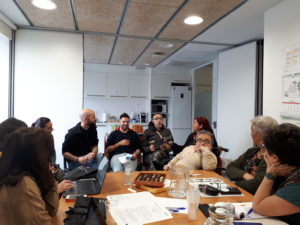A blog post by Guillaume Jacquinot

Inclusion Europe went to Barcelona for a meeting of the Human Rights working group at the offices of our member Som Fundació.
We were joined by members of the working group: Josep Tresserras (Som Fundació), Paula Campos Pinto (University of Lisbon, representing Fenacerci), Helene Holand (NFU), Jacqueline Schoonheim (Inclusie Nederland) and Céline Simonin (Unapei).
This meeting was a great opportunity to update members about our work, but also to learn their news.
We talked about our activities in connection with the European Parliament elections, our campaign and manifesto, our pledge for candidates and all the other resources we developed. We discussed encouraging changes in countries such as Denmark, France, Germany and Spain regarding the right to vote. We also highlighted strategies to empower self-advocates to participate in the elections and advocacy campaigns including Plena Inclusión’s “Mi Voto Cuenta” campaign.
We reviewed a number of policy papers currently being drafted by Inclusion Europe on these topics:
- Legal capacity and citizenship rights: We will look at how people can participate in the political life of their community and which legal barriers they encounter. The members of the working group highlighted how important it is to train people with intellectual disabilities in becoming active citizens. They also emphasised the need for awareness raising amongst professionals (including people working in the judiciary) and families who are often the ones encouraging people with intellectual disabilities to take an active role in politics.
- Minimum income and social benefit trap: Many people with intellectual disabilities, independently of if they are working or not, are socially and financially excluded and live in poverty. Negative perceptions of employers and discrimination of people with disabilities play a role in this, as well as the fact that people with disabilities often lose their social benefits once they start working. The members of the working group underlined that Inclusion Europe should address these issues, promote worker’s rights including a minimum income, and raise awareness about the economic and social costs of disability.
We heard from Jesús Martín (CERMI) about how civil society was mobilised during the second review of Spain by the UN Committee on the Rights of Persons with Disabilities. An alternative report (to the UN CRPD report) could focus on the impact of Spanish activists in strengthening civil dialogue and in advocating for amendments to the law.
Working group members presented their organisations’ activities:
- Unapei is following up on the collective complaint against the French government and is preparing the French alternative report on some key aspects of the UN CRPD: accessibility, equal recognition before the law, independent living, education, social protection and so on.
The organisation is also working on the topic of the European elections and created accessible material about the elections.
- Inclusie Nederland is involved in the preparation of the Dutch alternative report. The organisation moreover participates in a campaign called “Voting Without Limits” to empower voters with disabilities.

- Plena Inclusión works on the topic of access to justice by people who come into contact with the justice system (as victim, defendant or witness) and on another key issue: inclusive education. Regarding political participation, the organisation has produced easy-to-read materials and organised accessible activities involving people with intellectual disabilities in the context of their campaign Mi Voto Cuenta. In Spain, citizens got to vote at the national elections and will now cast their voice at European and municipal elections. A questionnaire was created which gives people with intellectual disabilities the chance to share their voting experience
- Fenacerci uses Inclusion Europe’s manifesto to mobilise people with intellectual disabilities. The organisation is also undertaking activities to prepare voters with intellectual disabilities for the election day.
Portugal, amongst other things, has introduced legislation which stipulates that 2% of staff members in businesses should be people with disabilities.
- NFU continues fighting re–institutionalisation in Norway.
During the working group meeting, we also heard about Som Fundació’s work in providing housing, so called “pre–guardianship” (solutions to prepare support after the parents of a person with an intellectual disability have passed away) and financial support to people with intellectual disabilities living in Catalonia. We heard about how they enable their clients to have more control over their own lives, for example by
- support for independent living
- assistance to people with intellectual disabilities in building their social live
- explaining in easy-to-read how they can manage their finances.
We also heard compelling testimonies from self-advocates:
- Carmen Piquer who fought for her right to vote
- Raúl Olivera who participates in the programme “Som Companys” (“We are colleagues” – a group of self-advocates who meet once per month to talk about common issues) and discusses legal capacity and sexuality with other self-advocates
- Raquel Manzano who wants to work and live independently in Barcelona
- Fernando Valero who wants to give something back to Som Fundació by helping older people
We left Barcelona with new insights and a feeling of pride in representing such an active network of dedicated members who, progressively, are making sure that people with intellectual disabilities have better lives in their countries.





